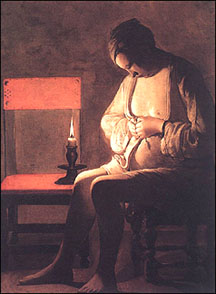
Mark but this flea, and mark in this,
How little that which thou deniest me is ;
It suck'd me first, and now sucks thee,
And in this flea our two bloods mingled be.
Thou know'st that this cannot be said
A sin, nor shame, nor loss of maidenhead ;
Yet this enjoys before it woo,
And pamper'd swells with one blood made of two ;
And this, alas ! is more than we would do.
O stay, three lives in one flea spare,
Where we almost, yea, more than married are.
This flea is you and I, and this
Our marriage bed, and marriage temple is.
Though parents grudge, and you, we're met,
And cloister'd in these living walls of jet.
Though use make you apt to kill me,
Let not to that self-murder added be,
And sacrilege, three sins in killing three.
Cruel and sudden, hast thou since
Purpled thy nail in blood of innocence?
Wherein could this flea guilty be,
Except in that drop which it suck'd from thee?
Yet thou triumph'st, and say'st that thou
Find'st not thyself nor me the weaker now.
'Tis true ; then learn how false fears be ;
Just so much honour, when thou yield'st to me,
Will waste, as this flea's death took life from thee.
Before the first line of the poem a flea sucked the blood of two people. Between the first and second stanzas one of the two people wants to kill the flee and after the third stanza the flea is killed. According to a traditional Renaissance belief, the blood of lovers mixed during sexual during sexual intercourse. In this poem the past relationship between the two characters was that they were once lovers, she has denied him (2) the chance to marry in this way ‘habitually killing him’ (16). The objective of the failed lover was to convince her that since the flea has ‘mingled’ their blood (4) it is like if they already have gone through a sexual relationship and as the tradition of that time she had to marry him (Stanza 1). In stanza 2 the speaker uses this excuse of the flea to marry her even if she and her parents don’t want to (4-5 2nd stanza). In the 2nd stanza he also tells the woman to not kill the creature because by doing so she would commit ‘three sins in killing three’’ (18) because she would kill her blood, his blood and the blood of the flea. Before stanza 3 the woman kills the flea and proves to the man that his fears on the sins committed by killing the flea where false in this way triumphing on him.
http://www.123helpme.com/view.asp?id=16300
http://lardcave.net/hsc/2eng-donne-flea-comments.html
Nessun commento:
Posta un commento